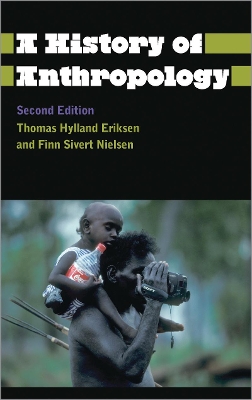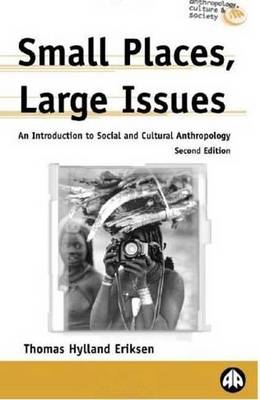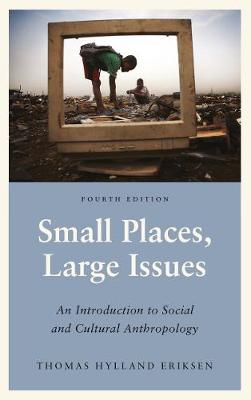Anthropology, Culture and Society
7 total works
A History of Anthropology
by Thomas Hylland Eriksen and Finn Sivert Nielsen
Published 20 October 2001
This is a thoroughly updated and revised edition of a popular classic of modern anthropology. The authors provide summaries of 'Enlightenment', 'Romantic' and 'Victorian' anthropology, from the cultural theories of Morgan and Taylor to the often neglected contributions of German scholars. The ambiguous relationship between anthropology and national cultures is also considered.
The book provides an unparalleled account of theoretical developments in anthropology from the 1920s to the present, including functionalism, structuralism, hermeneutics, neo-Marxism and discourse analysis. There are brief biographies of major anthropologists and coverage of key debates including totemism, kinship and globalisation.
This essential text on anthropology is highly engaging, authoritative and suitable for students at all levels.
The book provides an unparalleled account of theoretical developments in anthropology from the 1920s to the present, including functionalism, structuralism, hermeneutics, neo-Marxism and discourse analysis. There are brief biographies of major anthropologists and coverage of key debates including totemism, kinship and globalisation.
This essential text on anthropology is highly engaging, authoritative and suitable for students at all levels.
History of Anthropology, A. Anthropology, Culture and Society.
by Research Scholar Thomas Hylland Eriksen and Finn Sivert Nielsen
Published 1 January 2001
Leading anthropologist Thomas Hylland Eriksen shows how anthropology is a revolutionary way of thinking about the human world. Perfect for students, but also for those who have never encountered anthropology before, this book explores the key issues in an exciting and innovative way. Eriksen explains how to see the world from below and from within - emphasising the importance of adopting an insider's perspective. He reveals how seemingly enormous cultural differences actually conceal the deep unity of humanity.
Lucid and accessible, What is Anthropology? draws examples from current affairs as well as anthropological studies. The first section presents the history of anthropology, its unique research methods and some of its central concepts, such as society, culture and translation. Eriksen shows how anthropology helps to shape contemporary thinking and why it is inherently radical.
In the second section he discusses core issues in greater detail. Reciprocity, or exchange, or gift-giving, is shown to be the basis of every society. Eriksen examines kinship in traditional societies, and shows why it remains important in complex ones. He argues nature is partly cultural, and explores anthropological views on human nature as well as ecology. He delves into cultural relativism and the problem of understanding others. Finally, he describes the paradoxes of identity - ethnic, national, religious or postmodern, as the case may be.
Lucid and accessible, What is Anthropology? draws examples from current affairs as well as anthropological studies. The first section presents the history of anthropology, its unique research methods and some of its central concepts, such as society, culture and translation. Eriksen shows how anthropology helps to shape contemporary thinking and why it is inherently radical.
In the second section he discusses core issues in greater detail. Reciprocity, or exchange, or gift-giving, is shown to be the basis of every society. Eriksen examines kinship in traditional societies, and shows why it remains important in complex ones. He argues nature is partly cultural, and explores anthropological views on human nature as well as ecology. He delves into cultural relativism and the problem of understanding others. Finally, he describes the paradoxes of identity - ethnic, national, religious or postmodern, as the case may be.
This introduction to social and cultural anthropology has become a modern classic, revealing the rich global variation in social life and culture across the world.
Presenting a clear overview of anthropology, it focuses on central topics such as kinship, ethnicity, ritual and political systems, offering a wealth of examples that demonstrate the enormous scope of anthropology and the importance of a comparative perspective. Unlike other texts on the subject, Small Places, Large Issues incorporates the anthropology of complex modern societies. Using reviews of key works to illustrate his argument, Thomas Hylland Eriksen's lucid and accessible overview remains an established introductory text in anthropology.
This fourth edition is updated throughout and increases the emphasis on the interdependence of human worlds. It incorporates recent debates and controversies, ranging from globalisation and migration research to problems of cultural translation, and discusses the challenges of interdisciplinarity in a lucid way.
Presenting a clear overview of anthropology, it focuses on central topics such as kinship, ethnicity, ritual and political systems, offering a wealth of examples that demonstrate the enormous scope of anthropology and the importance of a comparative perspective. Unlike other texts on the subject, Small Places, Large Issues incorporates the anthropology of complex modern societies. Using reviews of key works to illustrate his argument, Thomas Hylland Eriksen's lucid and accessible overview remains an established introductory text in anthropology.
This fourth edition is updated throughout and increases the emphasis on the interdependence of human worlds. It incorporates recent debates and controversies, ranging from globalisation and migration research to problems of cultural translation, and discusses the challenges of interdisciplinarity in a lucid way.
This work provides a systematic examination of anthropological research on the critical issue of ethnicity. Chapters cover all aspects of ethnicity, including: approaches to ethnicity, social classification, the social organization of ethnicity, ethnic identity and ideology, ethnicity and social change, minorities and nationalism and ethnicity.
Fredrik Barth is one of the towering figures of twentieth-century anthropology. This intellectual history traces the development of Barth's ideas and explores the substance of his contributions. In an accessible style, Thomas Hylland Eriksen's biographical study reveals the magic of ethnography to professional anthropologists and non-practitioners alike.
Exploring his six decade career, it follows Barth from early ecological studies in Pakistan, to political studies in Iran, to groundbreaking fieldwork in Norway, New Guinea, Bali and Bhutan. Eriksen argues that Barth's voracious appetite for fieldwork holds the key to understanding his remarkable intellectual development and the insights it produced. The book raises many of the same questions that emerge from Barth's own work - of unity and diversity, of culture and relativism, of art and science.
Exploring his six decade career, it follows Barth from early ecological studies in Pakistan, to political studies in Iran, to groundbreaking fieldwork in Norway, New Guinea, Bali and Bhutan. Eriksen argues that Barth's voracious appetite for fieldwork holds the key to understanding his remarkable intellectual development and the insights it produced. The book raises many of the same questions that emerge from Barth's own work - of unity and diversity, of culture and relativism, of art and science.





